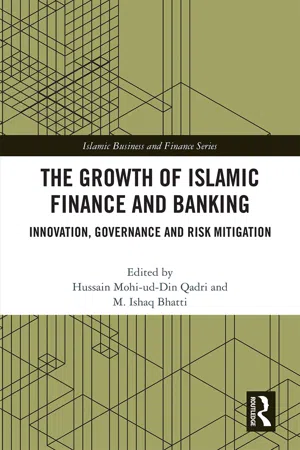
The Growth of Islamic Finance and Banking
Innovation, Governance and Risk Mitigation
- 346 pages
- English
- ePUB (mobile friendly)
- Available on iOS & Android
The Growth of Islamic Finance and Banking
Innovation, Governance and Risk Mitigation
About this book
This book covers the recent literature concerning Islamic banking and finance (IBF), focuses on the history of IBF since its inception and introduces the latest innovative concepts and practices in the field.
The authors cover important topics such as the role of ownership, Shari`ah compliance and governance structures in raising debt capital using IBF practices, including Fatwa issues and the use of benchmarking practices. The book also addresses topics like archival data, the influence of leverage on ownership structure, and sukuk structures, as well as misconceptions, threats, challenges and opportunities in IBF. Finally, the book deals with prominent issues such as business score-carding, Tak?ful (Islamic Insurance), IBF implications for block-chain-based fintech and finance hub concepts in Islamic microfinance models.
This edited volume is an important contribution to the IBF literature as it provides a much-needed in-depth look into industry practices through the perspective of corporate finance and governance. With its interdisciplinary approach covering legal and financial issues along with a wide variety of notable contributors, this book will be a valuable reference guide to both teachers and students of Islamic banking and economics.
Frequently asked questions
- Essential is ideal for learners and professionals who enjoy exploring a wide range of subjects. Access the Essential Library with 800,000+ trusted titles and best-sellers across business, personal growth, and the humanities. Includes unlimited reading time and Standard Read Aloud voice.
- Complete: Perfect for advanced learners and researchers needing full, unrestricted access. Unlock 1.4M+ books across hundreds of subjects, including academic and specialized titles. The Complete Plan also includes advanced features like Premium Read Aloud and Research Assistant.
Please note we cannot support devices running on iOS 13 and Android 7 or earlier. Learn more about using the app.
Information
Table of contents
- Cover
- Half Title
- Series Page
- Title Page
- Copyright Page
- Table of Contents
- List of figures
- List of tables
- List of contributors
- Preface
- Acknowledgements
- The growth of the Islamic finance and banking industry: an introductory note
- 1 Standardization in the Islamic banking & financial system: the methodology of inclusion (Taqlid al-Madh’hab)
- 2 Recent development in Islamic finance and financial products
- 3 On the role of ownership and governance structure in raising capital: a sukuk example
- 4 Takāful (Islamic insurance) on the blockchain
- 5 IT-based Finance Hub: a new horizon towards transparent Zakat distribution model
- 6 The way towards standardizing Islamic economic, financial, and banking fatawa
- 7 The fallacy of conventional benchmarks in Islamic banking and finance: defining, defending and discussing with evidence from archival data
- 8 Influence of leverage on ownership structure-performance relationship: a panel data approach of Islamic and conventional banks of Pakistan
- 9 Dynamic correlation and volatility linkage between stocks and sukuk
- 10 Provision of riba by religious faith: A comparative analysis
- 11 Layers of misconceptions about IB: are Islamic banks threats, challenges and opportunities for investors
- 12 Overview of progress in Islamic commercial and social finance in Pakistan
- 13 Translation of economic verses by Shaykh-ul-Islam Muhammad Tahir-ul-Qadri in the light of translation studies: comparison with other translators
- 14 Drawing inferences from Ali ibn Abi Talib’s Teachings on social and collective responsibility for a fair and just economy
- 15 Pricing anomaly: tale of two similar credit-rated bonds with different yields
- 16 Resolving Islamic finance disputes through arbitration in the Middle East
- 17 Formation of tangible capital from intangible capital and venture philanthropy: an innovation in Islamic finance
- 18 Theoretical, practical vis-à-vis legal development in Islamic banking: a case of Pakistan
- 19 Islamic safety nets for the poor: Pakistan’s experience
- Concluding remarks on the growth of the IBF industry
- Index